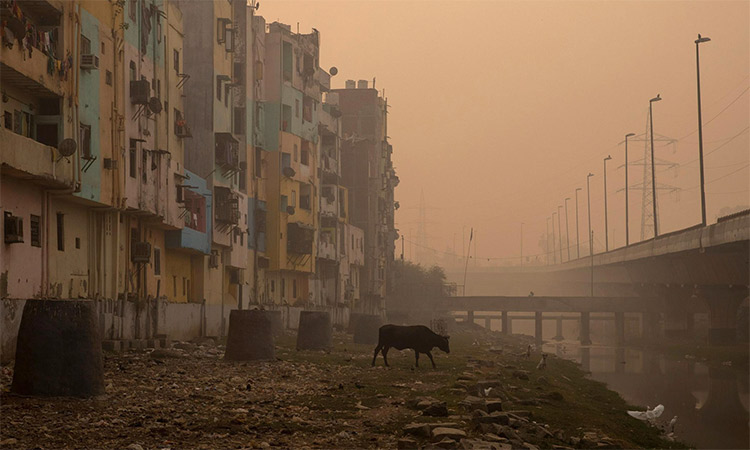
New Delhi, India: A residential area is covered in smog. Reuters
Indian Union Finance Minister Nirmala Sitharaman announced an allocation of Rs30,300 million for the Ministry of Environment, Forest and Climate Change (MoEFCC) for the financial year 2022-23, of which Rs46,00 million were allotted towards control of pollution, which is Rs100 million less than the last year’s Budget.
Numerous experts have pointed out a number of urgent and pressing needs that the Indian government should address in the current fiscal year. One of the most important calls has been for a separate body to address climate change issues. This has been backed by states proposing setting up a dedicated ‘environment council’ to oversee and implement the country’s climate related action and activities.
At the recent World Sustainable Development Summit (WDSD), state representatives suggested a separate body for climate action.
At a ‘ministerial session on sub-national leadership for inclusive green growth’ at the WSDS organised by The Energy and Resources Institute (TERI) from February 16-18, Maharashtra’s Environment Minister Aditya Thackeray had proposed an environmental council on lines of the GST Council, saying having such a body would help set targets at the national level and implement at the state level.
Other state representatives, including ministers also proposed the creation of an independent body to help implement more targeted action. The Centre and all the states and territories of the Union pointed out that implementation aspects of climate change action, such as mitigation, adaptation, and resilience, often fall on the state governments. Therefore, a dedicated body is needed.
According to a TERI press release, Mr Aaditya Uddhav Thackeray, Minister of Environment, Government of Maharashtra at a ‘Ministerial Session on Sub-national Leadership for Inclusive Green Growth’ at The Energy and Resources Institute’s (TERI) annual flagship event, said, “On the lines of the GST Council, if we have the environment and forest ministers of all states along with the Union Minister of Environment in a council, I think that is where we can set targets and policies at the national level and implement at the state level.”
Ministers at the session highlighted the need to develop new measures and yardsticks for assessing and addressing climate change-related impacts. Thackeray suggested publishing an annual environment report. “We can think of an ‘Ease of Living’ report that lists out environmental steps and targets, and what can be done in terms of climate action such as mitigation, adaptation and resilience,” he observed.
Dr Palanivel Thiagarajan, Finance Minister, Tamil Nadu, said, “Lot of implementation needs to happen at the local body, district and the state level. While policies are framed at the national level, bulk of the work is to be done at these levels.”
Emphasising the crucial role of sub-national governance to tackle climate change as well as aid green growth, Mr James K Sangma, Minister for Forest and Environment, Government of Meghalaya, said, “The need of the hour is to have a concerted effort where all the states come together, put aside their differences and work collectively…“Meghalaya aspires to be a leader to create a green bloc coalition to find solutions to fast depleting natural assets.” Pointing out that Meghalaya and Arunachal Pradesh form the biggest carbon sinks crucial for India to honour the commitments made at the Paris Agreement, he stressed the need for the North-Eastern region to be a unique green laboratory.
Experts have backed the states’ proposal to set up an environment council, saying it would assist in the development of green policies for implementing India’s climate action, but added that that it will be crucial to see how such an agency interacts with the present regulatory bodies.
Recently, the Indian Supreme Court asked the Centre for a response to a plea seeking establishment of an ‘Indian Environment Service’, following a recommendation by a high-level committee. The plea cited a report that was submitted by the committee, which was chaired by a former Cabinet Secretary, and was constituted by the Ministry of Environment, Forests and Climate Change in 2014.
It contended that this committee recommended the creation of a new ‘Indian Environment Service’, noted the need for an institutional framework to meet future needs, and proposed a National Environment Research Institute on the lines of the Indian Council of Forestry Research and Education. The plea also called for the creation of an Indian Environmental Service Academy, which would train officers in environmental law enforcement.


